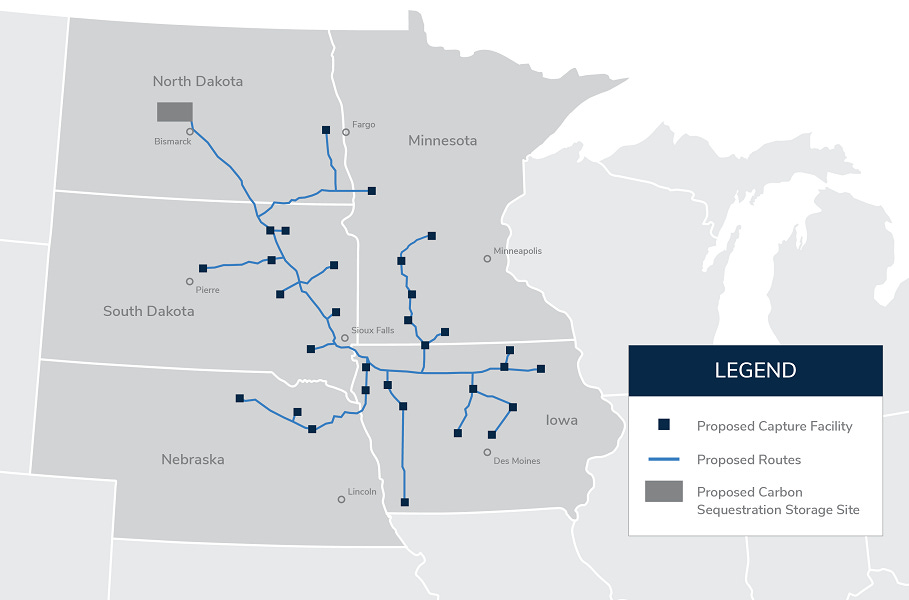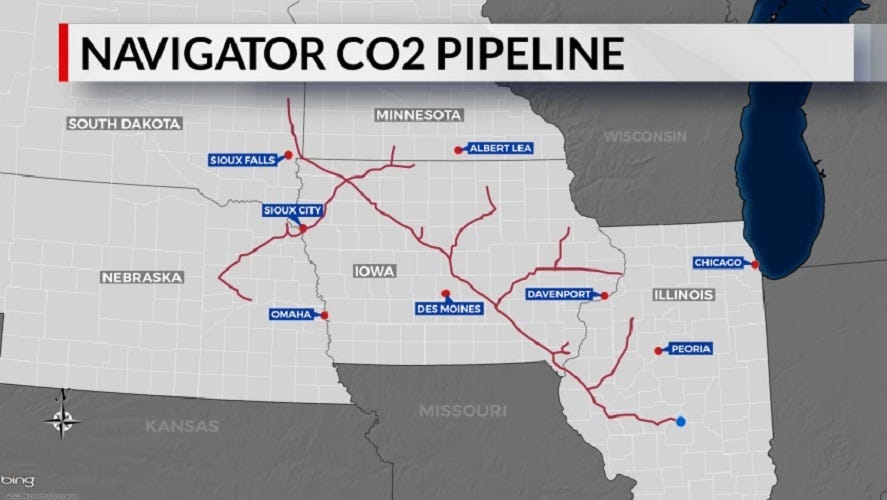South Dakota Farmers VS Climate Change Grifters: 1 & 0
Will Victory Be Permanent Or Temporary?

If you do not reside in the upper MidWest, from where Americans obtain much of our food, you may not be aware of ANOTHER climate change grift, partially funded by YOUR tax dollars and promoted by the Biden Regime, which is designed to 1) reduce America’s food supply; 2) steal property from farmers & ranchers; 3) continue transferring tax dollars to Big Business & the Ruling Elite; and 4) destroy jobs.
The South Dakota Public Utilities Commission recently denied two private companies permits to construct carbon-capture pipelines in the state. Navigator and Summit Carbon Solutions both got rude awakenings when the elected board chose to protect property rights over their demands for easements over landowners’ objections. Summit is currently suing over 80 landowners, demanding the courts employ eminent domain* to take parts of their land from them.
CARBON CAPTURE PIPELINES: NO SCIENCE, STILL PUSHING AHEAD
Carbon is the chemical backbone of life on Earth. Carbon compounds regulate the Earth's temperature, make up the food that sustains us, and provide energy that fuels our global economy. Most of Earth's carbon is stored in rocks and sediments. The rest is located in the ocean, atmosphere, and in living organisms.
Climate change hysterics has created the asinine notion that there is too much of this life-enhancing, natural gas. With funding from our tax dollars, “carbon-capture & sequestration technology” (CCS) was developed to collect CO2, pressurize it and ship it in liquid form through miles of pipelines for burial deep underground.
Climate-change scientists have not yet settled on whether CCS is the best way to reduce carbon emissions, nor whether spending billions on CCS is the best use of taxpayer money and industry investment in their efforts to reach net-zero emissions of greenhouse gases and protect the planet from “climate change.” There are natural methods of CO2 reduction, such as expanding forests. Nevertheless, they push on, destroying the land.

DESTROYING LANDOWNERS’ RIGHTS TO FURTHER THE GRIFT
For more than a year, a highly divisive debate raged in South Dakota over two proposed underground carbon dioxide pipelines that would capture the so-called toxic gas from ethanol plants and carry it to North Dakota and Illinois for disposal underground.
Complex, multi-faceted discussions and permitting processes are taking place in six affected states (North Dakota, South Dakota, Nebraska, Iowa, Minnesota & Illinois) over whether, and how, to site, build and put into operation the combined 3,300 miles of pipelines that operators hope to have in place and flowing in 2024.
The stakes are extremely high, with billions of dollars of investment and tax dollars in play, hundreds of landowners & millions of acres affected and the stability of South Dakota’s $3 billion ethanol industry hanging in the balance. The permitting process and legislative involvement hold the potential to forever alter landowner rights in South Dakota and further codify the ability of corporations to implement eminent domain to use the land of property owners without their consent.
The debate in South Dakota, where one pipeline would cross 470 miles and the other 111 miles of mostly farmland, has taken on greater significance as Public Utilities Commission members face decisions that could alter the lands, the laws and the lives of South Dakotans for an inestimable number of years. So far, PUC members have sided with the landowners. What will the legislature do? What will the courts do?

DAMAGE TO FARMLAND
Dozens of South Dakota landowners, most of them farmers, have had their land targeted for use by the pipeline companies, increasing fears that eminent domain may be used to dig through their land without consent.
Pipeline construction tears up the land with an inherent risk of leakage. To construct the pipeline farmland is turned over and taken out of production, which affects drain-tile systems and water-flow patterns. Lease payments from the pipeline companies are minimal compared to the financial loss in productive land.
“You’re trying to take an environmentally destructive activity and rebrand it in a way that makes it appear benign,” said Basav Sen of the Institute for Policy Studies. “Attempting to capture that carbon and store it in the ground is a non-starter for all kinds of reasons having to do with science, social justice, and economic feasibility.”
Charlie Johnson runs an organic farm in Lake County. Johnson took a vocal stand against the Dakota Access Pipeline when it crossed his land, and will do so again regarding Summit’s CO2 pipeline project, which also wants to cross his land. Johnson feels sorry for property owners who feel they have no choice but to allow a pipeline on their property, because it is disruptive to the land and to their livelihoods.
“It’s a highway of uncertainty for the landowners,” he said. Johnson said it took a year for the upturned and mixed soil on the oil pipeline route to recover, and in most cases it remains unproductive. “Look at the destruction they’ve done cutting through farmable land and a pristine prairie,” he said. “And now, it will be 2,000 miles from Illinois to North Dakota.”
Some landowners are concerned that the pipelines’ construction and maintenance could reduce agricultural yields on affected land even without leaks. Farmers are also worried about potential leaks of the heavier-than-air gas affecting people and livestock.
“Ultimately, this pipeline is not a public utility,” said Don Kass, a farmer and chairman of the Plymouth County board of supervisors in Iowa. "This is a profit center for a very select group of people."
FEDERAL TAXPAYER MONEY
The U.S. Congress has been largely supportive of CCS, allocating billions in funding to support research and development of carbon-capture projects. From 2010 to 2020, Congress provided $10.7 billion to CCS-related activity and programs, according to an October 2021 Congressional Research Service report.
The Biden Regime’s omnibus $1 trillion infrastructure package provided another $12 billion for carbon-capture research and projects. Much of that funding is available to companies that build and operate carbon-capture projects, in particular through the ongoing 45Q tax-credit program. The laughingly named Inflation Reduction Act of 2022 also provides ten of millions of tax dollars for the unproven carbon-capture pipelines.
Don’t live in South Dakota so you don’t care what happens to these farmers’ land? You eat, don’t you?
FORCING AMERICANS TO LIVE IN "HUMAN KENNELS"
This American was honored to join Dan Happel’s “Connecting The Dots” for a two-hour discussion about how the Globalists/Marxists are destroying property rights. The goal is to force all Americans off the land, whether you are a farmer/rancher or just a homeowner with a small lot, and into small, government-owned apartments in large cities. My co-guest…





One can only hope that the farmers react as did farmers in Owens Valley when LA built a huge pipeline to steal their water.
The entire climate change hoax gets worse and attacks the middle class (that it is their goal to destroy) more aggressively every single day. We’d better react forcibly soon...
Someone more savvy than am I should look into Navigator CO2. This is the company who is “controlling” CO2. I am politically jaundiced enough to expect this company to be “involved” with our Congresspersons and Senators. Controlling the carbon footprint is ideal for thevextraction of our tax dollars.